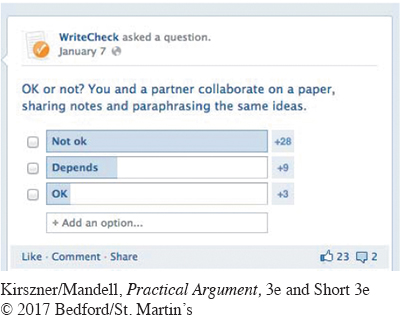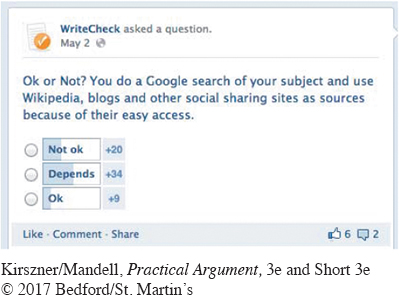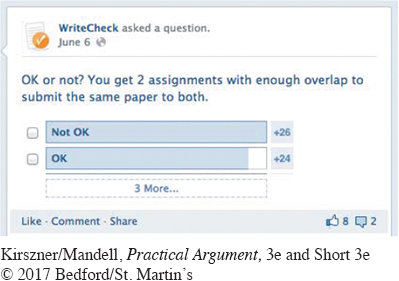Balibalos, OK or Not?
This summary was posted on July 24, 2014, on the WriteCheck.com blog.
OK OR NOT?
K. BALIBALOS AND J. GOPALAKRISHNAN
1
OK or not? This is an age-
2
This new poll series brings to light common scenarios—
POLL QUESTION #1
“OK or not? You and a partner collaborate on a paper by sharing notes and paraphrasing the same ideas.”

3
We started off the series by asking about collaboration because collaborating with peers is a common thing to do among students. Students “collaborate” to complete schoolwork and to help their friends in need. But collaborating with peers can sometimes cross ethical boundaries. For example, in this question, has the student copied-
Page 402
The Results
4
The majority of respondents (28) chose “not OK” in response to student collaboration on a paper. However, two viewers who weighed in had a different perspective.
5
English Instructor, Beth Calvano, made the following comment: “If the paper is supposed to be individual, this scenario is not okay. If, according to plagiarism rules, it is not acceptable to use another person’s ideas without citing that individual, collaborating in this way is not ethical. Your paper should consist of your own notes and original ideas.”
6
Facebook fan Quenna Corchado agreed with Calvano, adding: “I think it’s okay if they are citing. It doesn’t matter if they are using the same sources as long as they cite it. They are helping each other out, so it makes sense that they are using the same notes and paraphrasing the same thing. What is important is to cite everything accordingly, which doesn’t make it plagiarism.”
7
Overall, it can be concluded from these responses that it is “OK” to share notes and paraphrase the same idea with proper attribution, unless the assignment is supposed to be done individually.
POLL QUESTION #2
“OK or not? You do a Google search of your subject and use Wikipedia, blogs, and other social sharing sites as sources because of their easy access.”

8
This situation resonates with students because of the amount of free, available information due in part to the mass connectivity of the digital age. Nowadays, Wikipedia is synonymous with accessibility and reader-
Page 403
The Results
9
Based on 34 respondents, “depends” was the top answer, followed by “not OK” (20 respondents).
10
To provide some insight, Jason Chu from Plagiarism.org weighed in with the following comment: “It’s OK to use Google search, Wikipedia, and social sharing sites as the starting point for doing research for a paper. But you should NOT rely on these sources alone. In fact, Wikipedia entries typically list references that are great to use in your research in support of your paper. But, by and large, sources that rely heavily on crowd-
11
Jessica from WriteCheck argued that it was “not OK,” citing educator insight that social sites should never be cited in research papers. Academic writing requires looking at primary or secondary sources, which are typically presented in academic journals, whereas Wikipedia is written for the general public.
12
Overall, it can be concluded that the answer is “depends.” Social sites like Wikipedia can be used as a starting point for research papers, but adding academic credibility to your sources will result in a more thorough and scholarly research paper.
POLL QUESTION #3
“OK or not? You get 2 assignments with enough overlap to submit the same paper to both.”

13
The most recent poll was inspired by a recent article on the Ethicist, a blog on the New York Times, entitled, “Can I Use the Same Paper for Multiple College Courses?” Some readers see it as a stroke of genius, while others view it as the mark of laziness. Some suggest that it is cheating, while others opine that you are only cheating yourself. International Business Times writer James DiGioia disagreed with The Ethicist in his article, “The Ethicist Is Wrong: Self-
Page 404
The Results
14
The results were evenly split among the poll respondents between “not OK” and “OK.” The Ethicist describes why this situation is tricky, explaining that emotionally, our hearts cry that “this must be unethical, somehow,” but aside from these emotions, he argued that there were no grounds that inherently make submitting papers to multiple assignments unethical.
15
Unlike James DiGioia, Jason Chu of Plagiarism.org agreed somewhere in the middle, saying: “OK—
16
In summary, although debatable, it could be concluded that submitting a paper to multiple assignments is “OK” with approval from both instructors. Otherwise, it may be a violation of university-
Conclusion
17
These three scenarios are real-
18
While definitions and rules of plagiarism are debated, learning the definitions and how to cite properly, as well as working with instructors when a question arises are all ways to avoid plagiarism and academic misconduct.
19
Have you encountered situations where you asked yourself “OK or not?”
AT ISSUE: SOURCES FOR UNDERSTANDING PLAGIARISM
This blog post reports the results of a survey, and it also makes a point. In one sentence, summarize the main point of the post.
Which of the writers’ three scenarios, if any, do you see as “not OK”? Why? With which majority opinions, if any, do you disagree? Explain.
For what purpose did the writers design this poll? Where do they state this purpose?
Who is the intended audience for the three poll questions? Is this the same audience as the one the writers expected to read the results of the poll? How can you tell?
Page 405
In poll question #2, what conclusions do the writers draw about the use of Wikipedia? What problems does this site, as well as “blogs and other social sharing sites,” present for college students?
Do you think the writers’ conclusion takes a strong enough stand on the issue discussed? Is this post actually an argument? Why or why not?